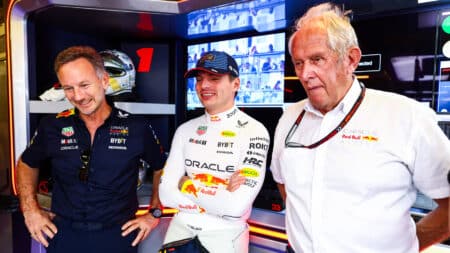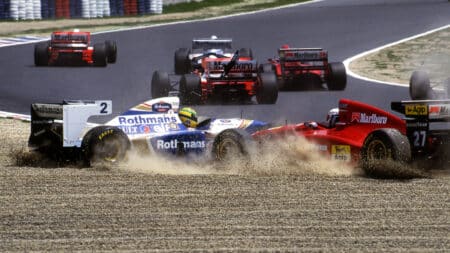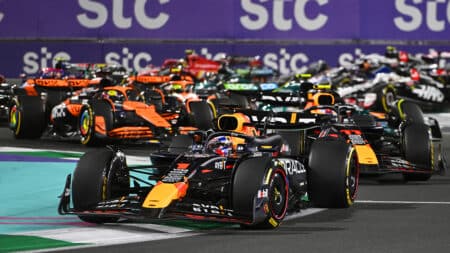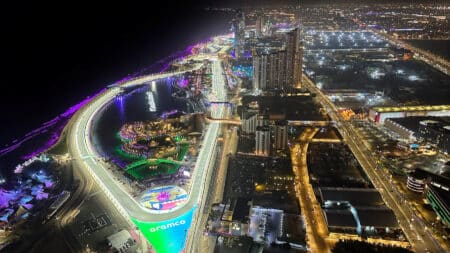
How real are Red Bull's concerns that Verstappen could leave early?
Helmut Marko caused a stir after the Bahrain GP with his worries that Max Verstappen could leave Red Bull early. But how real are those fears?
Newly crowned five-time world champion Lewis Hamilton in his own words
Lewis Hamilton carried himself subtly differently into the season-closing races, once the fifth title had become a formality. There was about him an ease and graciousness close-up, something that was very apparent when we spoke with him in Austin about his 2018 season, as if the competitive shield, that protective force drivers often put around themselves in a title campaign, had been dropped just a little.
But it was more than just that. He has won this title through performing at a more consistently high level than his rival Sebastian Vettel (and a better-performing team) and he knows as well as his team the crucial difference his own personal performances have played in the achievement. But that inner certainty hasn’t intensified the cocksuredness that any top competitor has, but rather softened it, the success revealing a humour and goodwill – and a willingness to drill down into the details into his season.
In the following interview you will hear him talk of his rivalry with Sebastian Vettel, where he draws his performances from, God, Fernando Alonso and much more.
Here, then, is Lewis Hamilton on 2018 in his own words.
There have been two combined narratives to the season. Ferrari has dropped the ball and you’ve knocked it out the park.
(He smiles) The description is not too bad. I didn’t say it! You said it!
It’s been an incredible season, so tough. Mentally and physically for everyone in the team. On the drivers’ side, the mental side has been the key. Ferrari were so strong at certain points of the year. Particularly in the first half of the season; we didn’t know how it was going to end. But the best parts of the season have been when we’ve been on the back foot and it’s not looked great, in terms of we might lose seven points – which doesn’t sound like a lot, then we ended up further back for whatever reason, then managed to claw our way back and collectively to do a better job overall – than their team and their driver. I think that’s really what’s made the difference this year, which is something the whole team can be really proud of.
When Ferrari had the superior car, how difficult was it to stay concentrated, to not get into panic?
Usually what happens in those scenarios is you over-drive. So not over-driving, but letting it come to you a little bit in the car. There’s only a certain amount you can do. One thing I’m good at is over-driving. I can over drive but not to the point where it’s detrimental – controlled over-driving. We all over-drive at some points. But it’s something I don’t feel I’ve done much this year, maybe early in the season to compensate for issues I was having with the tyres or whatever.
Then we came to the middle part of the season. [For Spa] we were all pumped coming back in with this great upgrade coming. It was a big frickin’ upgrade, the biggest I’ve had apart from 2009 [at McLaren] when we had a really shit car and a massive 0.8sec upgrade for Nürburgring. But, yes [Ferrari] came [to Spa] with as big, if not even bigger one!
I say ‘why didn’t you make a note of that, you’re going to forget that and I am going to forget to remind you again.’
Ferrari were ahead at Spa and then qualified 1-2 at Monza, then you flipped it around on Sunday, and that seemed to be when the title was finally prised open.
We qualified third, which [in itself] wasn’t really a psychological blow because we’d lost the race before so we knew we were up against it coming into Monza. But I was pissed off with myself because maybe with a perfect lap I could’ve qualified second. I never hold back on myself and I thought, ‘Shit, I’ve done all that practising then you ***k it up in qualifying,’ I lost half a tenth here or there and that would’ve been the difference between second and third. Saturday night it was difficult and I was thinking a lot about how aggressive I wanted to be on the Sunday. It’s very difficult to gauge how aggressive to be. You go too far, spin off, cause an accident, crash or whatever. Or you don’t do enough and you don’t capitalise on the window that was there. That’s always the unknown. You don’t know what’s going to happen until it’s presented to you and that’s the great thing about motor racing. Every Sunday, every Turn One, every Turn Two has been different. You can’t predict what the other guy’s going to do. It’s the most exciting part. It’s also nerve-wracking.
I would say that Sunday was probably the biggest psychological blow for them [in the season]. Seb’s psychologically difficult time was when he made a personal mistake [at Hockenheim] and as a driver that’s… when the team makes a mistake it’s painful, but when it’s you and when it’s in your control, that’s a horrible feeling. He would have taken that to heart.
Then we had that fight at Monza. That would’ve been a team blow for them. But we didn’t get complacent after that great result for us. We knew we still had to execute, going to places like Singapore where Ferrari again usually destroy us. And what a weekend it was.
None of us predicated that we would’ve won in Hockenheim or Monza or particularly Singapore. Collectively we’ve all done an amazing job in this team. How we manage our sessions, depending upon whether we go out first in qualifying or later on, which the Ferraris always do and get stuck in traffic. We’ve listened to each other and really executed.
Have you raised your game there? There seemed fewer occasions when you got lost with the car?
No I wouldn’t say so. Look at Australia, we lost the first Grand Prix when we should have won. There’ve been many areas…
But in terms of getting most from the car, not so many weekends where car got away?
Oh, I have. Look at China. That was a shocking weekend. Montreal was a shocking weekend. Definitely there have been those. That first half of the season wasn’t great and we had that spice of magic in Melbourne [qualifying] and thought: ‘OK, if we can hit this every time.’ But then we couldn’t find it again.
So what is the difference between first and second halves of season?
You’re writing the book as it goes and you don’t know which tangents are going off. You’re learning about a car, learning what it likes and where its ride-height sweet spots are. After a race can say ‘oh we should’ve had more wing on’, ‘should’ve had rear ride height a bit higher’ and more consistent car in this part of the track. Finding the balance is something you are fighting with every weekend. There’s so much information.
You’ve also talked in the past about saving yourself for the second half of the season, always aiming to be better in second half.
Not saving. We didn’t hold back, we were giving it everything. It’s just that you get that summer break, get the chance to look at the first half of the season, look at the strengths and look at the weaknesses and see if you can fill in the spots. There’s bits and bobs from each race that can fill in the blanks from the other races and if you put that puzzle together and do that well, you should be able to have a stronger second half season.
You’ve hit some incredible highs this year. More of those highs. Why?
Definitely. What you don’t get to see is I have this large group of people to utilise. They’re my tools, my soldiers, whatever you want to call them. How you get the best from everyone. We all individually think we’re operating at the highest but one of us can lean against another and pull more out of them. My job is to try to extract the most from every single person there. So, how you debrief, how you understand personally, how you engage with everyone when you have a shit weekend, how you lift everyone up. How you nurture that and build upon it has been key this year.
Just earlier on I was in here with my closest guys – my engine engineer, on the electronics there’s a couple of guys who’ve been my… they’re the guys I’m most connected to in terms of talking, to extract the most out of them. How I get the best out of each and every one of them is key.
Mercedes-Benz is such an iconic company, I just didn’t believe they were going to lose. They are such racers.
But they’re not the ones pulling 3sec a lap on Vettel in the wet at Hockenheim…
Yeah but if I didn’t get those guys in the right positions, I wouldn’t be able to extract what I have in me. I have always had what I have in the way I am driving but if they mess up or slip or didn’t do something right, I can’t unlock the potential in the car, and that’s why it’s a collective group.
How much better have you become at extracting that from those around you?
I can’t put a number to it. Far, far, far. 2007 me wouldn’t have a ****ing chance. And he was still very quick.
So the basic ability is the same but in terms of how much you can extract it, would you say you’re on a different level to back then?
Yeah, a much, much different level. Even this year… Last year, I was trying to figure out the amazing season we’d had and how could I improve on that. When you have won the championship, it is easy to just ride the wave and think it’s great. But I am always wanting to raise the bar. Even now, in this meeting, I was saying to them, for next year, we need to do this different, I need this analysis done better, so let’s look into that when we get to the end of the race season. I am always shooting things out and they make a note and if they don’t make a note, I say ‘why didn’t you make a note of that, you’re going to forget that and I am going to forget to remind you again.’
Would you rate the ability of not making a significant mistake in such a long season higher than the peaks in terms of importance to the outcome?
What I would say is they have allowed me to enjoy the highs more. But making mistakes… it is a hard year to go a long, long time. But the thing is, making mistakes but not big blips that are causing me positions. Well, in qualifying, that little 0.1sec can cost me a position in qualifying but I have more often than not recovered from it. So there are always errors. Next year I know, how do I work on myself so I don’t have those losses of 0.1sec, and minimise it. If there has been, whatever, 17 Grands Prix so far, there have been a small handful of those 0.1sec losses, but the races have been the real strength.
But what is key to minimising the mistake rate?
Discipline is very much key, diligence is very much key, how you study and prepare for a race. Which I’ve always done but these guys want to give you 100 books to read. But you’ve got to know which ones. You can only read a certain amount and you have to know which ones to pull from and utilise. Experience comes with that. And then more so in the race, like Monza, the experience of knowing when to push and how not to push; it is not all won on the first corner or the second corner. There is always thinking of the longer game but also maximising in the short term.
How different is the experience when you’re fighting a faster car, which the Ferrari was at certain points in the season?
It is amazing. I love it.
From 2014: Decoding the enigma
Does it change your approach? Did you ever think the season was slipping away?
No, I always felt like they were not too far away from arm’s length. But I love it when it’s that scenario. The difference I’ve always felt I’ve had… I started when I was younger and this kart was crap, it was bent to shit, and my dad made it look great, but it was not very good. So I always started at the back of the grid and I had to make up for the losses of the car. So when they say what we are paid for is that extra 0.1sec or 0.2sec or 0.3sec you are able to bring, it has been great this year to be able to stretch it a little bit more and live in that stretched area. It is a noticeable difference from one car to the other. And then when I am sitting having those negotiations, I was like, there is going to be a day when you need that extra little bit that is going to make the difference between first and second.
Do you have a regret that Fernando, who is soon bowing out, has not been in that Ferrari in recent years, that you haven’t really had as long competing in an equal car with him as you might have?
I feel like people underestimate that 2007 season and skim past it so much. Yes I did, unlike other people, come in with a top team but it is easier in some respects to be in a lower team where you don’t have so much pressure on you. Being in a top team straight away and having to try to deliver to a two-time world champion, who has been through what I have been through to this point almost, is a huge demand and it was one of the toughest years of my life. Plus, I had not had any fame, all of a sudden people taking pictures of me, travelling more than ever. It was tough but looking back now I really appreciate that year, but I wish I knew what I know now.
I don’t regret he didn’t go in a better car. When I am just doing a press conference with him, and people say ‘questions to the two world champions’, in my mind I know he could have had more world titles but ultimately it’s not like he didn’t have opportunities. He could go almost wherever he wanted to go. And decisions are very key. Decisions as to where you place yourself. If you wrongly think you control the driver market – he believed he controlled it, in my understanding – but there is also Seb and me, and as soon as he gave up the position, Seb grabbed it and then it’s not like he could go back. Then he was like, ‘I’ll go for Seb’s spot,’ but then they filled it with Max, and then he was like, ‘Oh, shit,’ and there was no place for him. But I have so much respect for him. He is a phenomenal driver and I think through these years it has not been a bad thing because his respect level has still remained very, very high on how he has driven, how he has conducted himself exploring outside in different realms.
Look, I could make the decision to leave this team and it could either bode well or go bad for me.
To what extent are those sort of decisions luck?
I don’t feel it was luck when I came here. I really did a lot of homework and I took my time. I was speaking to different people within different teams. I did my pros and cons for each option I had, because I did have other options, but when I sat with Ross, it was interesting. I was like: ‘Well, what are you doing to be better? Currently you have 400 people in your team and at McLaren we have 800 or whatever it is. There is no way you can possibly keep up with the rate of development we have, so what are you doing about it?’ It was the questions I asked that gave me a better understanding. But then I knew that at the rate they were hiring it could take longer but I just think Mercedes-Benz is such an iconic company, I just didn’t believe they were going to lose. They are such racers. Honda has had great experience but they are not racers like Mercedes. It is not by chance they are the most successful manufacturer at the moment.
Where do those peaks you talk of come from? Do you feel them coming?
It’s all about seizing the moment. When it rains in Budapest, for example, I would imagine it is easy to look at it and think, ‘Shoot, that makes it much harder for us all.’ That is looking at the glass half-empty. I look at it the other way, like ‘This is an opportunity for me. Great. They were actually quicker in the dry. Now I know I can make the difference in the wet if I put it together.’ Now, knowing it initially and actually doing it is two different things. Then I go into the zone of how am I going to put this lap together to make sure I’m ahead.
A head space?
I think it’s a head space, yeah.
Do you feel it happening in the middle of a race, like at Hockenheim?
In Hockenheim, no. I didn’t know it was going to rain, so you are progressing mentally in the race. But then when it started to rain I’m like ‘OK, I’m gonna catch him’ and I also know that he’s thinking I’m gonna catch him. I’m sure they’re telling him where I am.
The night before, recovering from the loss… a bit like at Silverstone in ’15 when Nico got pole. I was distraught but came back the next day and won. In that race, qualifying was out, he was on pole, how do I minimise now the loss? It’s how you recover from those. That psychological operation for me is the most powerful.
Do you need an enemy to bring out the best in you?
The best was brought out of me when I started last in karting and didn’t have better equipment. I had to really reach and make a difference. I guess that’s adversity. In those pressurised moments, that’s when I feel I can be at my best.
From 2008: Lewis Hamilton, the Senna connection
Hockenheim you said you prayed the night before.
It was the day of. But yeah. But I don’t pray to win.
You don’t pray for rain for example?
No, I don’t pray for fortune. I always just ask… whether you’re talking to yourself or someone’s hearing you – but I want to be able to live to my potential today. Allow me to live to my potential today. I know I can be great but certain things gets in the way and you’re not always able to be great. Just allow me to run free.
But you got a real run of opportunities around that time. Hockenheim, Hungary, Spa qualifying.
Also Hockenheim there was so much negativity [crowd booing]. For me, that’s like the devil. Let me shine on this and turn that darkness, that booing, which is all dark, and turn it. For me the sun was shining even though it was raining.
The downpour afterwards on the podium was like a Hollywood film.
For me that felt biblical. If you knew the stuff that I’d said in my prayer and it was not predictable. Those things I had asked to work against. I didn’t ask for the rain at the end of the race. That was almost like… If you ever asked for a sign of something… wow that was a sign. It was really, like, ‘Holy shit’.
Did that sign make you believe more?
Erm, I don’t know about believe more… it definitely helped.
You used the term heaven-sent, like in Singapore qualifying.
I’m not saying that’s controlled from above or anything. When I say it’s heaven-sent, it’s just you’re always searching for perfection. You never get close to it. But that was the closest I felt the lap just went. It was awesome. For me, that was one of the best laps I’ve ever done.
You say ‘one of’ a lot.
Because I’ve got a really bad memory and can’t remember all my pole laps. I don’t want to be absolute about it and then remember, oh yeah there was another lap. But from what I currently have stored in my mind, yeah it was the best. But when I say it’s heaven-sent, it’s just about setting yourself goals and that feeling you have. Think of heaven, heaven’s a perfect place and on that lap I felt I was in a perfect place. In a beautiful place, an amazing feeling, balanced and at my best.
Hockenheim catching Sebastian, then Monza, then Russia when you came out behind him. What are you thinking? Your mindset. Are you thinking, I own you?
I never ever think I own you. I don’t use that mentality. But if you imagine, erm, look at [Floyd] Mayweather as he goes into the ring. I don’t think I’ve ever seen him not look like he knows he’s going to win. Even if the opponent is taller or whatever. It’s the same when I look at different athletes and wondering what’s the difference between them and how they are not nervous because they know what the other person may or may not do. But when I came out behind, I know where his strengths are, I know where his weaknesses are and I know where I’m better. So it’s game on. So I’m like, let’s dance. You might get the better hand of me this bit but I know how to get by you.
Vettel’s quite aggressive wheel to wheel.
Yeah, definitely. But he’s not reckless. It’s very borderline to be reckless, immature reckless or control reckless. The best, like Seb and Fernando, it’s not reckless. It’s aggressive but fair. That’s how I think he is.
From 2017: Hamilton vs Vettel

Helmut Marko caused a stir after the Bahrain GP with his worries that Max Verstappen could leave Red Bull early. But how real are those fears?

Ayrton Senna’s tragic final races in 1994, marked by controversy over illegal traction control and his relentless pursuit of excellence in a challenging car, remain a poignant chapter in F1 history, as Matt Bishop recalls

Full F1 schedule for the year, including the next F1 race of 2025: the Saudi Arabian Grand Prix, the whole calendar and circuit guides for the 24-race Formula 1 season

Round five of the 2025 Formula 1 season wraps up the first triple-header of the year in Saudi Arabia. There are the dates and start time for the Jeddah event, including all sessions